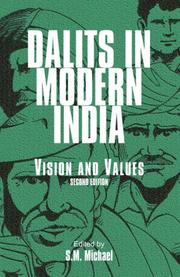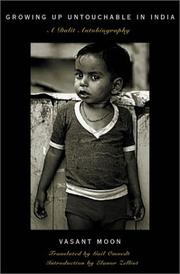| Listing 1 - 10 of 33 | << page >> |
Sort by
|
Book
ISBN: 1498541941 9781498541947 1498541933 9781498541930 9781498541947 Year: 2018 Publisher: Lanham, Maryland
Abstract | Keywords | Export | Availability | Bookmark
 Loading...
Loading...Choose an application
- Reference Manager
- EndNote
- RefWorks (Direct export to RefWorks)
Identity, Rights, and Awareness opens a much needed critical analysis of subaltern Dalit voice in India. Filling a lacuna in comparative analysis of the connections between anticaste social movement, communal identities, and marginalized voice, this book argues for the important role of narrative strategy in contending against oppressive systems.
Dalits --- Political activity --- India.
Book
ISBN: 9351508080 9351500888 9789351500889 9788132113119 813211311X 935150414X Year: 2014 Publisher: New Delhi, India Thousand Oaks, California
Abstract | Keywords | Export | Availability | Bookmark
 Loading...
Loading...Choose an application
- Reference Manager
- EndNote
- RefWorks (Direct export to RefWorks)
This title addresses four interrelated issues. It conceptualizes exclusion-linked deprivation of excluded and indigenous groups in Indian society and elaborates the concept and meaning of social exclusion in general, and of caste-, untouchability- and ethnicity-based exclusion in particular.
Book
ISBN: 935328256X 9353282578 9353282586 9789353282585 9789353282578 9789353282561 Year: 2019 Publisher: New Delhi
Abstract | Keywords | Export | Availability | Bookmark
 Loading...
Loading...Choose an application
- Reference Manager
- EndNote
- RefWorks (Direct export to RefWorks)

ISBN: 935280287X 1282017713 9786612017711 8132101340 9788132101345 9780761935711 0761935711 Year: 2007 Publisher: Los Angeles [Calif.] SAGE Publications
Abstract | Keywords | Export | Availability | Bookmark
 Loading...
Loading...Choose an application
- Reference Manager
- EndNote
- RefWorks (Direct export to RefWorks)
This second, revised and enlarged edition looks back at the aspirations and struggle. of the marginalised Dalit masses and looks forward to a new humanity based on. equality, social justice and human dignity. Within the context of Dalit emancipation,. it explores the social, economic and cultural content of Dalit transformation. in modern India. These articles, by some of the foremost researchers in the field,. are presented in four parts:. Part I deals with the historical material on the origin and development of. untouchability in Indian civilisation. Part II contests mainstream explanations
Dalits --- Political activity --- India --- Politics and government
Book
ISBN: 9352803663 9789352803668 Year: 2017 Publisher: New Delhi SAGE Publications
Abstract | Keywords | Export | Availability | Bookmark
 Loading...
Loading...Choose an application
- Reference Manager
- EndNote
- RefWorks (Direct export to RefWorks)
Dalits --- India --- Economic conditions. --- Social conditions.
Book
ISBN: 1315575795 1317154967 1317154959 1283115565 9786613115560 1409424405 Year: 2011 Publisher: Farnham, UK ; Burlington, VT : Ashgate,
Abstract | Keywords | Export | Availability | Bookmark
 Loading...
Loading...Choose an application
- Reference Manager
- EndNote
- RefWorks (Direct export to RefWorks)
A second generation of emerging Dalit theology texts is re-shaping the way we think of Indian theology and liberation theology. This book is a vital part of that conversation. Taking post-colonial criticism to its logical end of criticism of statism, Hebden looks at the way the emergence of India as a nation state shapes political and religious ideas. Keith draws on historical trends, Christian anarchist voices and the religious experiences of indigenous Indians.
Dalits --- Liberation theology --- Christian anarchism. --- Religion.
Book
ISBN: 0822361132 0822374315 0822361329 9780822374312 Year: 2016 Publisher: Durham : Duke University Press,
Abstract | Keywords | Export | Availability | Bookmark
 Loading...
Loading...Choose an application
- Reference Manager
- EndNote
- RefWorks (Direct export to RefWorks)
Analyzes the role of Dalits (formerly untouchables) in shaping modern India, including discourse about caste, and interrogates the dominant narratives that have been used to represent India's history.
Dalits --- Caste --- South Asia --- Regions & Countries - Asia & the Middle East --- History & Archaeology --- Brahmanism --- Ethnology --- Hinduism

ISBN: 0585394067 9780585394060 0742508803 9780742508804 0742508811 9780742508811 Year: 2001 Publisher: Lanham, Md. Rowman & Littlefield Publishers
Abstract | Keywords | Export | Availability | Bookmark
 Loading...
Loading...Choose an application
- Reference Manager
- EndNote
- RefWorks (Direct export to RefWorks)
Dalits --- People with social disabilities --- Moon, Vasant --- Childhood and youth. --- India --- Scheduled tribes.
Book
Year: 2022 Publisher: London : UCL Press,
Abstract | Keywords | Export | Availability | Bookmark
 Loading...
Loading...Choose an application
- Reference Manager
- EndNote
- RefWorks (Direct export to RefWorks)
What does the collapse of India's tea industry mean for Dalit workers who have lived, worked and died on the plantations since the colonial era? Plantation Crisis offers a complex understanding of how processes of social and political alienation unfold in moments of economic rupture. Based on long-term ethnographic fieldwork in the Peermade and Munnar tea belts, Jayaseelan Raj - himself a product of the plantation system - offers a unique and richly detailed analysis of the profound, multi-dimensional sense of crisis felt by those who are at the bottom of global plantation capitalism and caste hierarchy. Tea production in India accounts for 25 per cent of global output. The colonial era plantation system - and its two million strong workforce - has, since the mid-1990s, faced a series of ruptures due to neoliberal economic globalisation. In the South Indian state of Kerala, otherwise known for its labour-centric development initiatives, the Tamil speaking Dalit workforce, whose ance stors were brought to the plantations in the 19th century, are at the forefront of this crisis, which has profound impacts on their social identity and economic wellbeing. Out of the colonial history of racial capitalism and indentured migration, Plantation Crisis opens our eyes to the collapse of the plantation system and the rupturing of Dalit lives in India's tea belt. Praise for Plantation Crisis 'Raj's well-crafted ethnography offers profound and moving insight into the experience of Tamil Dalit plantation workers as they become alienated not just from their labour and its product, but from their families, communities, settlements and selves. An excellent read.' - Tania Li, University of Toronto 'An important, insightful and compelling story of the alienation of Tamil Dalit plantation workers, the disjuncture between economic and social mobility, the production of stigma and the role of caste and class, the failure of unions alongside that of the state and corporations, the destru ction of labour organisation yet the possibility of finding resistance. Not only a major contribution to the South Asian literature but also a decolonisation "must read".' - Alpa Shah, London School of Economics
Tea plantations --- Tea plantation workers --- Dalits --- Tea trade --- History. --- Economic conditions. --- Social conditions. --- India.
Book
ISBN: 1443844969 Year: 2016 Publisher: Newcastle upon Tyne, England : Cambridge Scholars Publishing,
Abstract | Keywords | Export | Availability | Bookmark
 Loading...
Loading...Choose an application
- Reference Manager
- EndNote
- RefWorks (Direct export to RefWorks)
Dalits --- Civil rights movements --- Political activity --- History --- Abuse of --- History. --- Andhra Pradesh (India)
| Listing 1 - 10 of 33 | << page >> |
Sort by
|

 Search
Search Feedback
Feedback About UniCat
About UniCat  Help
Help News
News